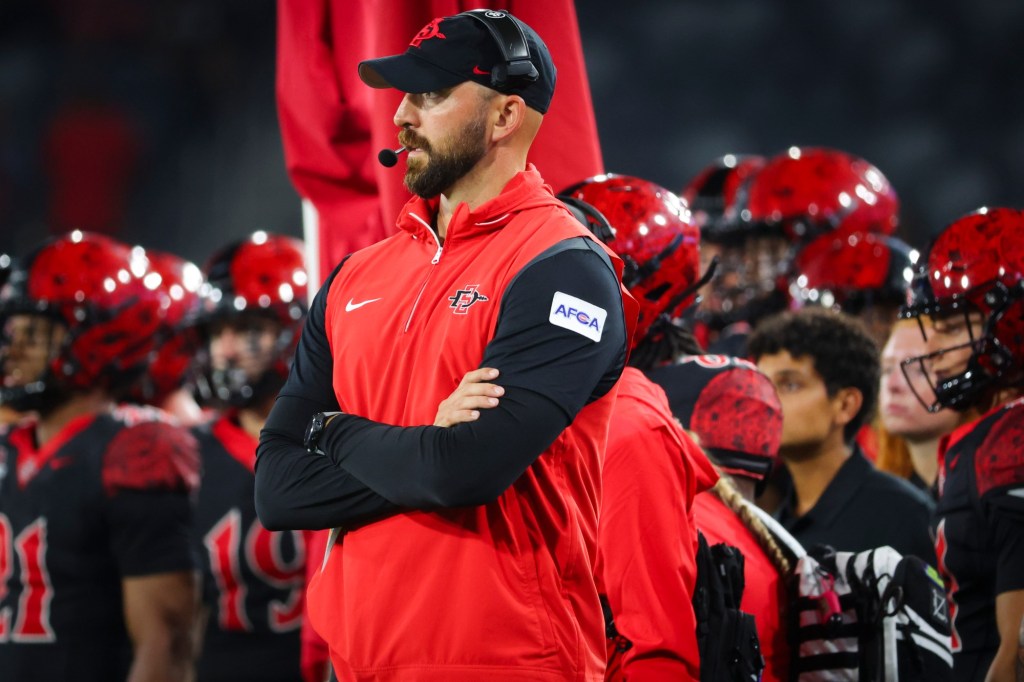When San Diego State got the ball inside its own 10-yard line with 76 seconds before halftime Saturday night at Washington State, there were those in the viewing audience who wanted to see the Aztecs run a couple of times and head to the locker room trailing by a field goal at halftime.
The viewers expressed as much on social media, although not until things had gone sideways, with a safety and Cougars touchdown that put the Aztecs behind 19-7 at the half.
SDSU coach Sean Lewis said the Aztecs are not going to play conservatively.
“Gonna be default aggressive,” Lewis said during Monday’s weekly midday press conference.
Lewis considered that SDSU was at its own 8-yard line with 1:16 remaining in the second quarter. He thought about the Aztecs’ uptempo offense and kicker in Gabe Plascencia, whose range extends beyond 55 yards. There was no reason, the coach thought, not to play for a game-tying field goal before the half.
“We sit on it, what’s the message that I’m telling my kids?” Lewis asked rhetorically. “ ‘I don’t believe in you.’ That’s the message. I believe in my guys. I can say that, or I can live it and I can do it.”
On first down, SDSU quarterback Jayden Denegal threw a 10-yard pass over the middle that wide receiver Jacob Bostick couldn’t grab.
On second down, Denegal was sacked in the end zone. Should he have gotten rid of the ball before Washington State’s Isaac Terrell got to him off the left edge? Should SDSU left tackle Christian Jones have prevented Terrell from getting past him?
No, Lewis said, it was on him for not putting the Aztecs in a better formation.
“Can I imagine it a little bit better?” Lewis said. “Sure. Absolutely. Can the kids execute it better? Yeah.”
What the coach didn’t think is that any players or coaches wanted to be conservative in such a situation.
“I think all of us in the foxhole together would rather us be default aggressive there,” Lewis said. “Not reckless, but default aggressive so that we can go down, get points, it’s 10-10. We know that we haven’t played our best ball. We circle the wagons and we go and respond.
“What happened? Worst-case scenario. Absolutely. We give up the safety. They go off the ensuing kick, get points, come out in the second half (and score again).”
The Cougars put 16 points on the scoreboard in five minutes of clock time and blew open a three-point game into a 26-7 advantage.
“It becomes this huge difference,” Lewis said. “So, yeah, we’ll Monday-morning quarterback. … We’ll second-guess it. But I was telling the boys about it (Monday) morning. We’re going to be default aggressive.
“We’ll manage it the right way. Get us in a different protection. But that’s why I’m sitting in front of you (media) guys. That’s my style of play. That’s what all the questions have been about in the past. High-flying offense that’s going to push the ball vertically down the field. That’s going to be something that the fans haven’t seen. Yeah, that takes time. Now we’re asking, like, ok, ‘should we be more conservative?’ No.
Concluded Lewis: “I am who am. We’ve talked about that before. I’m going to be authentically me, and I know my guys got my back. We’ve got to put them in a better call. We’ll execute better. At the end of the day, there’s a little bit of risk. We can’t be risk averse in all that we do. No risk it, no biscuit.”
At one point in the first half, the Aztecs had four straight three-and-outs against the Cougars. Lewis was asked about his mindset as a play-caller and whether he feels pressure to change things up when things aren’t going as planned.
“I don’t feel any pressure,” Lewis said. “Pressure is something you feel when you’re not prepared. We apply pressure and you look at (the situation) and you evaluate, you don’t take a generalized approach, like, ‘Oh, hey, well, there’s been three, three-and-outs, there’s been four, three-and-outs.’ So, all of a sudden, we’re going to pivot, right?”
Wrong.
“We have the beauty of knowing why there’s been a breakdown,” Lewis said. “Like, intimately, within the call. Why did it break down? Is it because of the call? Is it because of execution? Is it because of lack of communication? Is it a fundamental skill?
“Depending on what the ‘why’ is, then that drives our processes, not just, ‘Oh, there’s been three-and-out, three-and-out, three-and-out, three-and-out. Hey, throw this plan away that we’ve been preparing.’ There’s got to be a detailed ‘why’ behind what it is that we do, or why we’re going to pivot in the manner in which that we’re approaching everything.”
Lewis said the efficiency and consistency in SDSU’s execution needs to get better. It is something that will be addressed over the next two weeks before the Aztecs’ Sept. 20 game against Cal. SDSU (1-1) is idle this week.
“The details of our fundamentals and the physicality of our play needs to get better, in all three phases,” Lewis said. “By doing that, that’ll lead to greater execution, by putting the kids in better position to be successful with the calls, then we’ll have a better opportunity to have success over the long haul.
“But, no, we’re not going to abandon the plan. When the reason the plan is not being executed properly has nothing to do with who the gray, faceless opponent happens to be on the other boundary.”
